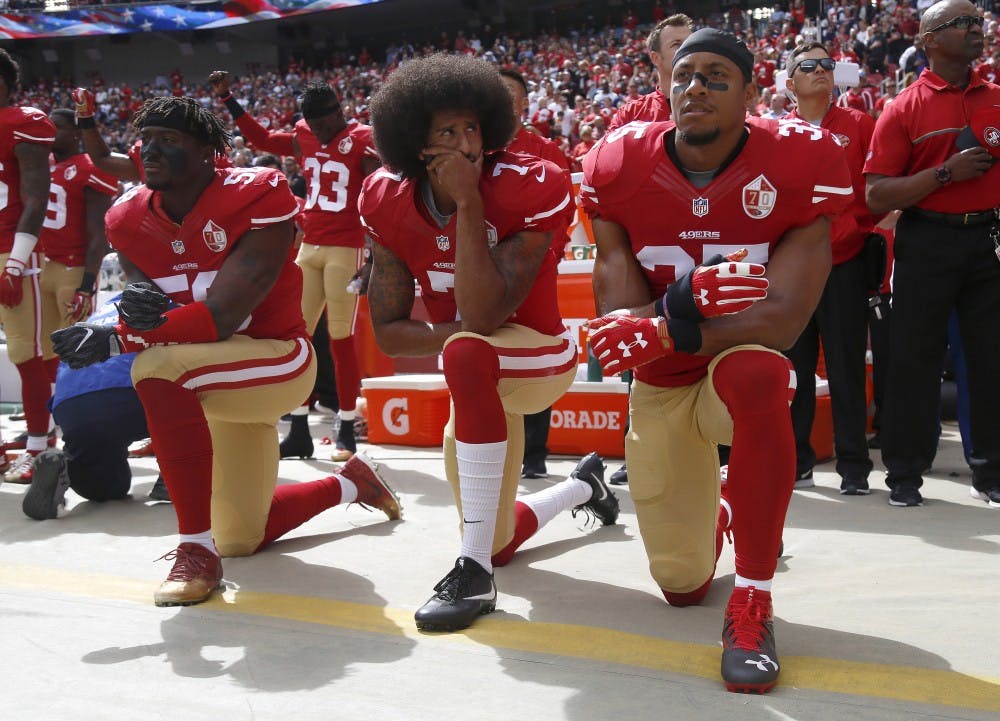When Colin Kaepernick chose to sit during the national anthem in August, I was disgusted. My immediate reaction was anger, because I took this gesture very personally, as did many others.
Colin Kaepernick is booed as he takes the field for warmups in San Diego. pic.twitter.com/n2maH6pn29
— USA TODAY Sports (@USATODAYsports) September 2, 2016
POTUS: I want @Kaepernick7 to listen to the pain that his actions might cause military families. #ObamaTownHall
— Jake Tapper (@jaketapper) September 29, 2016
I have always believed there is a fine line between disagreement and disrespect. For example, disagreement would be choosing not to place an American flag in your front yard on Veteran's Day. Disrespect would be burning the American flag in a public setting.
Regardless of the intent, the right to speak against our government, oppression and moral wrongdoings is an essential piece of the American lifestyle.
But for a moment, when Kaepernick chose not to stand I let my disgust turn to condescension and then to indifference. It went from "well, that's his right, even though I don't like it" to "what could Colin Kaepernick possibly know about oppression" to "who cares, he should be disregarded completely."
Over the past month or so, however, my perspective completely shifted. It was so easy for me to sit back and say, "I'm a military child and my family and millions of others sacrifice more than you could ever imagine for you to be able to act like that." It was not as easy to change my perspective and truly see it from Kaepernick's point of view.
My initial impression of Kaepernick's actions was that he was desperate to get back in the spotlight. I assumed he took the risk because his career was failing, or something along those lines. I now see that those thoughts stemmed from a personal bias, and I'm almost saddened that I wasn't able to see the bigger picture at first.
Sada Reed, ASU sports journalism assistant professor, said people should always research before they form an opinion.
“We want to do as much research as possible in order to put ourselves in that position," Reed said. "It's easy to demonize when something doesn’t jive with our personal experience, however if we’re taking the time to research, we do begin to see how things would be seen from that perspective."
Over the last few months, I've had the opportunity to interact with numerous Black Lives Matter protestors, supporters and even refuters. These interactions have shaped my understanding about the need for social justice advocacy and reform in the U.S.
The U.S. as a whole needs to stop skirting around the pressing racial issues in this country. At first, critics told Kaepernick he should've picked a more opportune time to express his opinion, like during a press conference or on social media. But there is another flaw in that line of thinking as well — we criticize BLM protestors for violence but when a protestor commits a completely peaceful act of protest we still find problems with it. At some point we have to stop silencing each other.
In the time since Kaepernick chose not to salute on Aug. 26, 99 people were killed by police in the United States. It would be wrong to assume that all of these were abuses of justice, but the recognizable names on the list are those that we as a society decided are the result of police abuse. With this knowledge and the testimony of many friends both online and in person, I now grasp the weight of this issue fully, whereas before it was disturbingly normalized to me.
There are issues I still take with Kaepernick. I cannot approve of him wearing a Fidel Castro shirt to a press conference. Nor is it acceptable for him to stereotype the entire country in his official statement by placing blame on America as a whole rather than the corrupt few that are actually responsible for the current race problem.
However, I urge others to take the time to detach themselves from their personal beliefs in the future, and to truly focus on empathizing with others. This nation has lost its empathy, and I'm sure Kaepernick's Twitter mentions would prove it.
If you shared in my belief that he was just a washed-up athlete at the tail-end of his career, take a moment to imagine what it would be like to feel constantly persecuted. Imagine what it would be like to be afraid to be stopped for a broken taillight. Imagine what it would be like to be scared to pick your children up from their bus stop. Maybe after you dwell on those thoughts, you'll understand why Colin Kaepernick risked a multi-million dollar contract so he could sit on a bench.
Kaepernick's choice not to salute is undoubtedly controversial, but it is equally as courageous. Whether you agree with his motivation, to risk your career and reputation for the sake of standing up for something you believe in is brave. Although he refuses to salute the flag, I will choose to respect his courage.
Reach the columnist at sphaas@asu.edu or follow @_SavannahHaas on Twitter.
Like The State Press on Facebook and follow @statepress on Twitter.
Editor’s note: The opinions presented in this column are the author’s and do not imply any endorsement from The State Press or its editors.
Want to join the conversation? Send an email to opiniondesk.statepress@gmail.com. Keep letters under 300 words and be sure to include your university affiliation. Anonymity will not be granted.




